Sun Yoga Basics
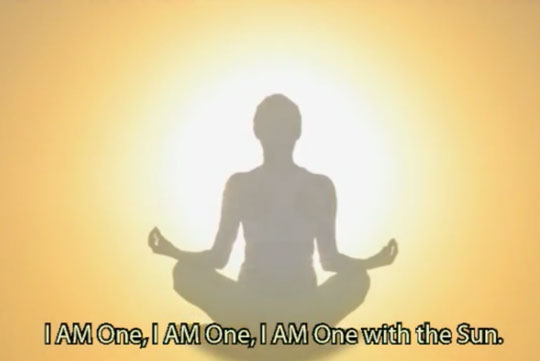
When we hear the word "yoga," we imagine a yogi twisting his body into a pretzel or performing special breathing exercises. This is hatha yoga or physical yoga. "Yoga" means union. The goal of every type of yoga is union with God, the Solar Presence. Hatha yoga tries to reach this union through the body, karma yoga through service, kriya yoga through light and colors. Jnana yoga attempts to unite us to god through study, reflection and intellectual activity. Bhakti yoga is the yoga of devotion. Raja yoga teaches concentration and self-control. Agni yoga is the yoga of spiritual fire and shabda yoga connects us through sacred words or mantras.
Surya yoga or sun yoga is the highest yoga and the fastest path to union. Omraam Mikhael Aivanhov wrote, “Surya yoga includes them all: adoration, wisdom, power as well as purity, activity and dedication, light and the sacred fire of Divine love… By the practice of Surya yoga you establish a link between yourself and the power that governs and gives life to the whole Universe: the sun.” By "sun" Omraam is referring to the spiritual sun which the physical sun is but a reflection.
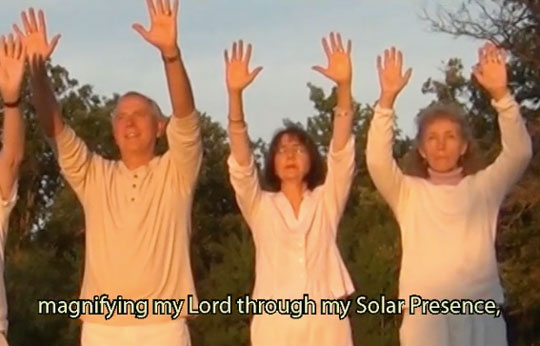
Sun yoga is still practiced as a daily ritual called Surya Namaskar by Hindus and Jains although its significance and correct procedure has been lost. It used to be a daily practice of many peoples throughout the world—Greeks, Egyptians, Essenes, Persians, Aztecs, Mayans, Incans, Tibetans and Chinese. In the last century, three people revived sun yoga in the West. The first was Omraam Mikhael Aïvanhov who left a vast body of knowledge during nearly fifty years of teaching. Over seventy books have been published from his lecture notes with enough material for 400 more books. One of Omraam's books that I highly recommend is The Splendour of Tiphareth which contains his teachings on surya yoga.
The second person was the maverick archeologist, Gene Savoy, who discovered several lost cities of South America, read the records of the ancient solar science and rediscovered its principles and techniques. However, Savoy kept secret this information which he called “Cosolargy” except to select initiates of his school by word of mouth. He made the transition on September 17, 2007 at the age of 80. Fortunately I had the opportunity to interview him two years ago.
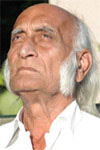
The third person is sun yogi Hira Ratan Manek (HRM) who in 1992 began to teach simple, safe and enjoyable techniques of sun yoga such as sun gazing* and sun-charged water. He had spent years researching and experimenting before he felt confident enough to offer this knowledge to the world. Since that time, he has taught hundreds of thousands of people attending over 1,500 lectures in a dozen countries across the globe.
After attending one of his lectures in May of 2005, I was inspired to assist HRM in his mission. I have organized about 36 lectures for him in Arizona and helped initiate a few in Montana and Chicago. I don’t consider him my guru. As he tells people in his lecture, “Sun gazing is a cost-free, guru-free practice that will free mankind from mental and physical disease and spiritual ignorance.”
HRM usually doesn’t like to talk publicly about advanced sun gazing techniques and the spiritual dimension of sun gazing because he wants to keep the teaching simple so that people will more likely try and continue the practice. However, if he is speaking to you privately or addressing an advanced group, he will introduce the spiritual aspects and share the following simple technique to activate the upper chakras: massage the tips of your thumbs with your forefingers clockwise on your right hand and counterclockwise on your left hand. Priests East and West use mala beads or rosaries to stimulate the pressure points in their thumbs which correspond to certain glands in the head and are associated with the three upper chakras. You can do this while sun gazing or barefoot walking.
However, for beginning sun gazers it is essential that you follow HRM’s protocol to the letter and not combine sun gazing with meditation, prayer, mudras, qigong and other spiritual techniques. A friend of mine began sun gazing but spent all this time in prayer also. As a result, she didn’t experience any benefits and quit the practice. If she had stayed in a receptive mode and simply gazed at the sun, she would have experienced benefits. Later on, after you have healed your mind and body, you can take on a more active role and pray, chant or do deep breathing exercises.
Sun Gazing Tools
Sun gazing is low-tech. It doesn't require much training. You don't need much equipment. All you need are the "bare" essentials: bare feet on bare ground and looking at the sun with your bare eyes. However, certain devices can help with timing your sun gazing session and measuring ultraviolet radiation. If you don’t have a digital watch or cell phone that you can set as a timer, you can purchase appropriately-named Sunbeam digital timers at WalMart for only $5.99.
Safe sun gazing time is generally from sunrise to one hour after sunrise or from one hour before sunset to sunset. You can find the times of sunrise and sunset in your local newspaper. But if you’re not sure, sun gazing should always be done when the UV index is below two. UV measuring devices can be purchased from $3 to $30, depending on how accurate a reading you want. The least expensive and least accurate is a UV intensity meter card. They are available for $3.00 from the Measurement And Technology Company.
The deluxe UV device is the UV100 watch from LaCrosse Technology. It has a built-in UV meter that measures to one decimal place and an alarm that beeps when the sun exceeds 2 for safe sun gazing and 5 for safe sunbathing. It is water-resistant, has a chronograph, timer, daily alarm, an hourly chime, a backlight, a pre-programmed calendar and comes with a one-year warranty. It is no longer being manufactured, but you can still find it on the web for as little as $23 from ambientweather.com.
How to Sun Gaze
HRM’s protocol is to gaze at the sun once a day when the UV index is close to zero—that is either within the first hour after sunrise or in the last hour before sunset. Some sun gazing teachers say that sunrise is better because it is more healing and enlightening. Omraam claimed that prana is most intense twenty minutes before and twenty minutes after sunrise. Sunset also is a time that is charged with energy and is conducive to meditation. This has to do with the angle of the sun’s rays impinging on the earth’s magnetic field at sunrise and sunset, charging the magnetic field and affecting the magnetite in your pineal gland.
Did you know you have magnetite in your pineal gland? That’s how birds are able to navigate back and forth from north to south along the magnetic field during migration. Morning sunlight has more ultraviolet whereas the sunset rays have more infrared. Both are beneficial, so splitting your sun gazing time between sunrise and sunset is perhaps most balancing. This is advisable when you start getting close to 45 minutes of sun gazing. To do it all in one session might require that you go past the safe window.
Stand or sit erect with bare feet on sand, dirt, mud, pavement or concrete, in that descending order of desirability. Regarding standing or sitting on grass, make certain it is already warmed by the sun, which could occur about 30 minutes after sunrise and is no problem if you sun gaze at sunset. Cold, wet grass is not recommended in that it may drain energy. (However, walking barefoot on warm, dewy, sun-charged grass in the early morning is a qigong technique that is very energizing. I once experimented with this. Noticing that I was coming down with a sore throat, I walked for a few days on dewy grass after sun gazing. The sore throat went away!)
HRM also advises against standing on a rock or in water while sun gazing. However, Omraam had his disciples sun gaze every morning on a huge rock overlooking the ocean. And yogis in India perform surya namaskar while doing ablutions in a temple pool or a sacred river like the Ganges.
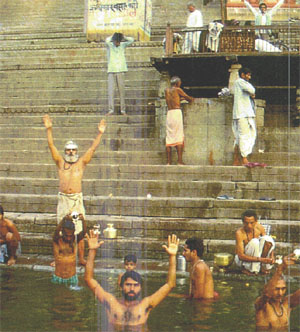
Drink a glass of water before and after sun gazing because sun gazing can be very cleansing and the water helps remove toxins. Also, water is yin and it helps balance the yang energy from the sun. That’s one reason why we always sun gaze barefoot on bare ground. Think of the sun as the positive pole and the earth as the negative pole. We’re the rechargeable battery. And if we want to be charged, we need good connections.
If you wear glasses, remove them. But it’s okay to leave contacts in. Gaze at the sun in a relaxed manner; don’t strain. It’s okay to blink the eyes. If your eyes tear, don’t rub them. Sessions start at ten-second lengths. Increase by ten seconds a day. If you find that too difficult at first, then gaze only five seconds and increase by five. If cloudy, sun gaze but don’t increase the time. When cold, gaze indoors through a window that does not have UV protection on it. Otherwise, sun gaze through an open door or window. If you live in a valley between east and west mountains and don’t see the sun in the safe hours, you may gaze at its reflection on polished obsidian stone or pure water if it is not too intense, never on salt water.
Between ten seconds and fifteen minutes, sun gaze in silence with arms hanging loosely by your sides. During this time, your may find that you become less tense, spend less time worrying, are happier, more self-confident and compassionate. It’s important at this time to be passive and receptive and allow the sun to heal your mind. Don’t engage in prayer, mantra, visualization or contemplation. Just be. Children under twelve should stop increasing gazing time at five minutes and remain at five minutes until that age. This is because their nervous systems aren’t developed enough to receive much energy from the sun.
Between fifteen and thirty minutes of gazing and your body will begin to be purified of disease and addictions. Different color pranas, aspects of the life force, are going to your respective organs to address any deficiencies. If you have myopia, remain at fifteen minutes of gazing time for a month or until you see improvement in your eyesight. Then you can increase your time. Sun gaze with arms outstretched to the sun, hands spread out and facing the sun. As you breathe in deeply, visualize healing rays of light coming from the sun and entering your left palm and traveling to areas of your body that require healing or strengthening.
If you have no problems, visualize the light going to your heart. Mentally affirm that the light is healing or strengthening you on a cellular level. Then as you breathe out, visualize the light returning to the sun through your right hand. Express love and gratitude for your healing. Establish a continuous flow of energy. If arms get tired, lower them with elbows at sides and hands still facing out.
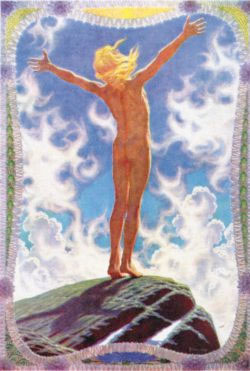
Use of this posture was called “fire blooming” by the Greeks because the radiance or essence thus channeled burned away impurities in the solar plexus, which is associated with the sun and fire. There is a fascinating science of mudras or the use of the hands and arms to form sacred geometric patterns during meditation and sun gazing. But this science isn’t required knowledge for beginning sun gazers. Just stand in the fire-blooming position.
After thirty minutes you may begin to feel free from desires such as food and material things. Fasting or dieting become easy, and you don’t get hungry because the sun satisfies your energy needs. Also, you may begin to have a greater capacity to love. Thus, begin with the energy circuit, but instead of seeing light going to problem areas in your body, see it creating a miniature sun in your heart and see the light from your heart radiating out to problem areas in the world. Mentally affirm that the light is bringing healing, sustenance, peace or whatever is needed in those situations. Also recite affirmations, mantras and fiats that connect you with divine intelligence such as the OM. Other mantras you may say may be, "I AM the Sun!" or "I AM the One!" or "I AM a Sun of God!"
If at any time, your peace of mind is disturbed, go back to sun gazing in silence with arms at your sides till your peace is reestablished. If at any time your health or strength is adversely affected, go back to visualizing light and affirming healing and strength in your body.
After sun gazing, press your palms to your eyes and gaze at the afterimage of the sun until it fades away. This should take only a few minutes. If you continue to see a spot that lasts for hours or days, make sure you are sun gazing within the safe hours. If you have been careful to gaze within the safe hours, it may be that your eyes are sensitive and you need to stop daily sun gazing until the spot goes away. Then sun gaze with eyes open for half your time; after which sun gaze with closed eyes for the remainder of your time. When you feel comfortable, resume normal sun gazing with eyes open the entire time.
After or before sun gazing or at some point during the day, walk barefoot for fifteen to 45 minutes. Barefoot walking on sun-warmed sand is another means of absorbing solar energy. It also massages the pressure points on the soles of the feet and helps balance the yang energy from the sun with the yin energy from the earth. The time you spend barefoot walking is also a good time to sunbathe. Another sun yoga practice is drinking sun-charged water. I will save that for a future article with recipes for sun tea and sun chi drink.
After about 35 minutes, you should begin to notice a decrease in appetite. If you don’t overeat out of habit but only eat as much as you desire, you may attain a state of inedia (non-eating) and gain all your energy needs directly from the sun, air, water and earth. However, inedia is not the goal of sun gazing. The goal is total health of mind, body and spirit.
If you feel that you’re ready to try inedia, first try what I call the “minedia diet.” Minedia means minimum eating. It consists of three small meals a day, consisting of one cup of food, preferably raw. The secret of this diet is to chew each mouthful 300 times and to breathe deeply between mouthfuls. The chewing extracts the prana from the food and the deep breathing provides prana from the air. Also, drink sun-charged water and soak seeds and nuts in it to get the maximum prana from water.
When you reach 44 minutes of sun gazing, reduce sun gazing time one minute per day until you are down to fifteen minutes and/or walk barefoot 45 minutes a day on bare earth and maintain that practice for a year. After that, you are fully charged and need only expose yourself to the sun for a few minutes a day to maintain your charge. However, if you enjoy sun gazing or barefoot walking, you may continue with it for as long as you like.
If you follow these sun gazing methods, you will have excellent results in general health and well being. If shortcuts are taken, such as increasing time too fast, not walking barefoot, not standing on bare earth, then the benefits are reduced. For most people sun gazing using these instructions is safe. Mental attitude is very important. If you are fearful that the sun will harm your eyes, then you should not gaze directly at the sun at first. Instead, gaze at the radiance of the sky before sunrise or after sunset. Eventually, your fear will go away and you will be able to sun gaze. Also, if you have a quiet faith that the sun will help you and express gratitude to the sun, results will be quicker.
Don’t be impatient. Don’t aspire or push or results will be delayed. Be as a little child and just enjoy the beauty of the sun without expectations or demands only with love and gratitude. When you receive energy and wisdom from the sun, use them in loving service to life.
*All material provided on www.heartscenter.org is based upon the sole opinions of the creators of this website or those contributing to it and is for informational purposes only. Any information contained herein does not take the place of professional advice from your health care provider nor is intended as medical advice or to replace a one-on-one relationship with a qualified health care professional. Information is a compiled report of existing data and/or research and intended as a sharing of knowledge and information from the research and experience of the webmasters and contributors. Approaches described herein are not offered as cures, prescriptions or diagnoses. The authors/webmasters assume no responsibility in your use of this information. We encourage you to make your own health care decisions based upon your own research and in partnership with a qualified health care professional. Consult your doctor before using any presented information as a form of treatment.
— Wayne Purdin
 Prayers and Songs
Prayers and Songs Broadcast Replays
Broadcast Replays